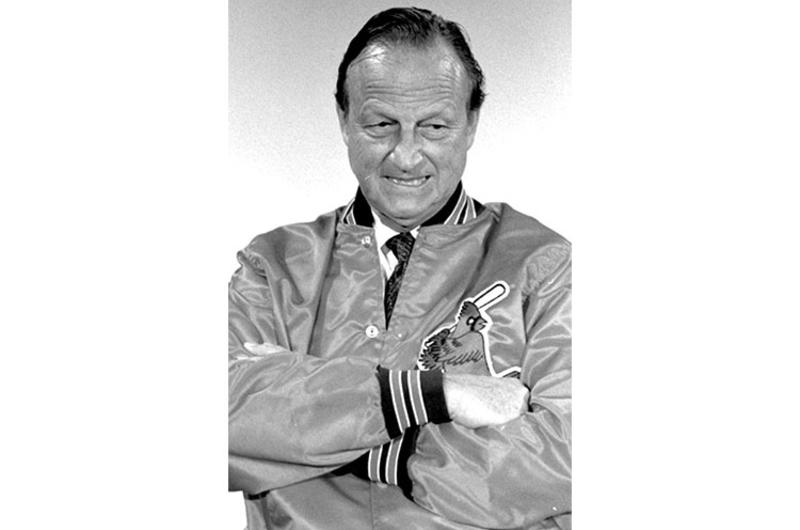

This website was created and maintained from May 2020 to May 2021 to commemorate the 75th anniversary of Stars and Stripes operations in the Pacific.
It will no longer be updated, but we encourage you to explore the site and view content we felt best illustrated Stars and Stripes' continued support of the Pacific theater since 1945.
Stan 'The Man' Musial — A class guy

Stan Musial talks with servicemembers in Tokyo in 1988.
By Lee Kavetski | Stars and Stripes January 24, 1988
Stan "The Man" Musial's baseball fame knows no boundaries.
The incomparable Musial, the classiest St. Louis Cardinal of them all who was inducted into the Baseball Hall of Fame in 1969, is proud to be in the Japanese Hall of Fame, too.
"It's a privilege to be honored in two Halls of Fame," Musial said in Tokyo while visiting Japan with three other Cardinals on a goodwill baseball mission last Tuesday.
"The Japanese love baseball so much, we love baseball so much. The Japanese have some of my equipment on display in their hall. It's darned nice of them. I'm flattered."
Musial, now 67 and a vice president for the Cardinals after playing in a Redbird uniform for 22 record-breaking years, recalled a 1958 postseason baseball tour of Japan when he was 37.
"I tried awfully hard to please the Japanese fans. But I remember hitting only two home runs," said the legendary Musial, owner of a .331 lifetime batting average and 475 career homers. "Home runs were what the Japanese expected of me. I was tired, worn out after the regular season. I'm sorry they couldn't have seen me earlier."
The Cards, managed then by Solly Hemus, won 14 games and lost two in Japan. Musial reminisced:
"The trip was one unending whirl of parades, ballgames, receptions, conducted tours, cocktail parties, dinners and entertainment. From the prime minister to the countless Japanese schoolkids we saw playing ball every day, the Japanese were gracious hosts, kind and courteous."
And so was Musial. He thrilled his idolizing fans at the ballparks by learning how to sign his autograph in Japanese characters.
There were laughs, too.
Musial recollected: "At one of the countless interviews I had with the radio and TV people, I mentioned that I was in the restaurant business. One writer asked, 'Ah, so, Musial-san. Are you then a waiter? "
Looking back, Musial said, "At first, I wasn't too keen about making the trip. I knew I'd be worn out. But I'm mighty glad that I went. That trip 30 years ago was worth it. I have lasting impressions. My wife does, too."
WIFE LILLIAN WAS in Tokyo again with Stan last week, along with three other Cardinals — Manager Whitey Herzog, outfielder Vince Coleman and shortstop Ozzie Smith. The Cards chatted with Japanese and American fans at Tokyo's American Club as part of a "Goodwill Baseball Mission to Japan" promotion by the team's owner, Anheuser-Busch. The Cards also visited the Republic of Korea to meet U.S. servicemembers.
When Musial retired in 1963 (he first joined the Cardinals in 1941), it required a full page in the record book to list the 60 major league categories in which he was No. 1. He was voted the National League's Most Valuable Player three times and won the NL batting crown seven times. He had 3,630 career hits — topped only by Pete Rose (4,256), Ty Cobb (4,191), and Hank Aaron (3,771) — and Musial hit .300-plus 18 times.
So Musial was asked the inevitable question in Tokyo — what was his greatest baseball thrill?
"Entering the Baseball Hall of Fame," answered Stan, who said modestly, "It's nice to be recognized." Musial was enshrined at Cooperstown, N.Y., in July, 1969, along with Roy Campanella, Waite Hoyt and Stan Coveleski.
Musial also cited getting his 3,000th hit ("a magic number") and playing in 3,036 games, all in a Cardinals uniform. Only two others played more games in the major leagues — Rose (3,562) and Hank Aaron (3,076).
And "The Man," ever the gentleman, added, "Of course, one of the greatest thrills for me was just in putting on the uniform."
Musial, who in his heyday earned a top salary of about $100,000, isn't envious about today's million-dollar-plus baseball salaries that seem the rule rather than the exception.
Stan shrugged, "TV makes the big money available right now. Today's ballplayers are in the right place at the right time."
But he can't understand why some of the modern-day ballplayers resort to drugs.
Musial said, "It's sad — to ruin a career like that. They are throwing away the opportunities of a lifetime. It is hard to comprehend."
"THE MAN," WHO first got that nickname in Brooklyn where his line drives all but knocked down the Ebbets Field scoreboard, said he admires two of today's sluggers — the Yankees' Don Mattingly and the Royals' George Brett. Said Stan: "They hit hard."
A testimony to Musial's greatness is a magnificent 10-foot bronze statue of him that stands at the entrance to Busch Stadium in St. Louis.
Musial said in Tokyo, "It's a great personal honor. But I like to think of the statue as a symbol for young athletes — as a symbol of what could happen to them."
The immortal Stan "The Man" is a class guy.


